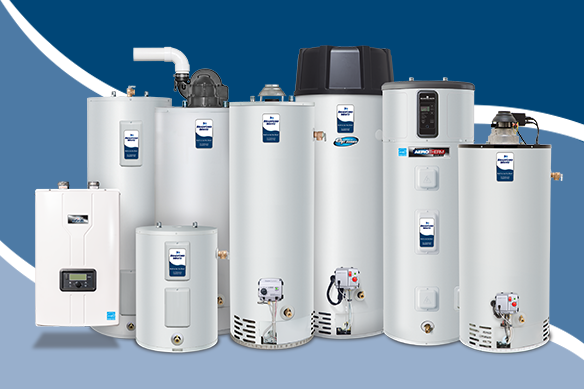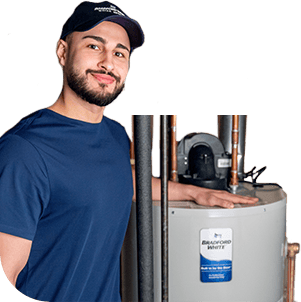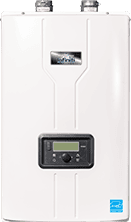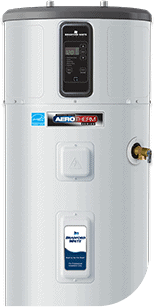The Ultimate Water Heater Buyer’s Guide: Which Type Is Right for You?

Hot water is essential to the comfort and convenience of your home, but it comes at a cost. Water heating is the second largest user of energy in your home, accounting for about 18% of your utility bills every month. So, choosing the right water heater with a good balance of cost, performance and energy efficiency is critical. With a wide variety of water heater types to choose from, each having unique features and benefits, this decision can seem daunting. In this article, we’ll guide you through the most common types of water heaters and help you determine which one is the right match for your home and lifestyle.
1. Electric Water Heaters: Instant Gratification Meets Budget-Friendly
For many homeowners, electric water heaters are the go-to choice because of their cost-effectiveness and simplicity. They use heating elements that are fully submerged, ensuring better energy efficiency. They’re especially popular in smaller households that don’t require a large supply of hot water at once.
Why Choose an Electric Water Heater?
- Affordability: Electric water heaters are often less expensive.
- Easy Installation: Electric water heaters are typically easier for your plumbing professional to install which can help lower installation costs.
- Space Savers: With no need for gas lines, electric systems can be more compact and installed in smaller spaces.
- Environmentally-Friendly. There are no emissions from an electric water heater, so no venting is needed. The operation is friendly to the environment.
- Electric is Available: Electricity is readily available, so an electric water heater is often the default choice if natural gas and propane are not accessible in your area.
Consider When Shopping
- Recovery Rate: This is how quickly the unit can reheat water once it’s been depleted, which directly relates to the size of the heating elements. Be cautious of purchasing a smaller, less expensive model that doesn’t meet your needs. For example, if you have a larger family and an undersized electric water heater, you may find yourself waiting for the water heater to heat the water before you can take a shower. Your plumbing professional can help make sure you get the right electric water heater for your needs.
- Upfront Cost vs. Operating Efficiency: While they might be cheaper up front, electric units can sometimes be less energy-efficient than their gas counterparts, leading to higher utility bills over the life of the water heater.
Want to learn more about electric water heaters? You can view a selection of electric water heaters from Bradford White here.
2. Natural Gas Water Heaters: The Trusty Workhorse
Natural gas water heaters are a staple in many American households. They’re known for their quick water heating rates and their ability to work even when the power goes out. Efficient and generally low-maintenance, they’re a reliable choice for larger families who need a lot of hot water.
Why Choose a Natural Gas Water Heater?
- Fast Recovery Rates: This means you’re less likely to run out of hot water with a gas water heater, even with multiple users.
- Lower Operation Costs: Gas is often a cheaper fuel source than electricity, resulting in lower monthly bills.
- Longevity: Gas water heaters have a long lifespan for years of reliable operation.
Consider When Shopping
- Ventilation Needs: Gas models will need proper ventilation, adding to installation complexity and cost.
- Safety Measures: Gas models require a bit more caution for two reasons. First, there’s always a small risk of gas leaks, so a proper installation by your plumbing professional is important to ensure safety. Second, gas water heaters use a live flame which could ignite flammable vapors around the water heater. Some companies take steps to prevent this from occurring. For example, Bradford White’s Defender Safety System uses Flammable Vapor Ignition Resistant technology with ScreenLok® to prevent possible ignited vapors from traveling outside of your water heater.
- Local Utility Incentives: Check with your natural gas provider for any available rebates for installing a high-efficiency unit. You can search here for available rebates and tax credits.
Want to learn more about gas water heaters? You can view a selection of gas water heaters from Bradford White here.
3. Propane Water Heaters: The Off-Grid Champion
If natural gas isn’t an option at your home, propane water heaters offer a similar experience while being cost-effective. They work under the same principles as natural gas units but require a propane tank for fuel. They’re perfect for rural homes and off-the-grid living.
Why Choose a Propane Water Heater?
- Independence from Electrical Grid: Propane water heaters can work during power outages, offering peace of mind in areas prone to outages.
- Eco-Friendly Option: Propane is a clean-burning fuel, making it a greener choice compared to traditional fuels.
- Reliable Performance: Like natural gas models, propane heaters can provide quick and continuous hot water to multiple fixtures.
Consider When Shopping
- Storage Considerations: Determine the size and location for your propane tank.
- Delivery and Supply Costs: The availability and cost of propane can vary, so do your research beforehand.
- Professional Installation: To ensure safety, always have a licensed professional install your propane water heater, especially the gas connection. Need a plumber? Search here to find a Bradford White professional in your area.
4. Tankless Water Heaters: Small Package, Big Impact
Tankless water heaters are gaining popularity for their compact design, outstanding performance, and energy-saving capabilities. Tankless water heaters provide an endless supply of hot water. They only run when hot water is needed, so they are very efficient. You don’t need to keep a large tank of water, which also saves you space. Tankless water heaters are perfect for any homeowner who wants great performance and long-term energy savings.
Why Choose Tankless?
- Energy Efficiency: No standby heat loss means lower energy bills and reduced carbon footprint.
- Unlimited Hot Water: Tankless water heaters heat water as needed, so the water stays hot for as long as you need. Imagine never running out of hot water again!
- Space Saving: Wall-mounted designs free up floor space in smaller homes or utility closets. With a tankless water heater, there’s no need for a large tank of hot water in your basement or attic space.
Consider When Shopping
- Upfront Cost: Tankless water heaters can be more expensive than traditional tank models.
- Retrofit Considerations: If you’re replacing a tank model, you might need to upgrade your electrical or gas systems to accommodate a tankless unit. Speak to your plumbing professional to learn about your options.
- Flow Rate: Determine the flow rate for your household—the number and type of fixtures you’ll be using simultaneously—to choose the right size. Talk to your plumbing professional to make sure you get the right size tankless water heater for your needs
Want to learn more about tankless water heaters? Check out the Infiniti® Series of Tankless Water Heaters from Bradford White.
5. Heat Pump Water Heaters: The Climate-Conserving Choice
Heat pump water heaters can provide impressive energy savings. They work by pulling heat from the air to help heat a tank of water, making them much more efficient than traditional electric models.
Why Choose a Heat Pump Water Heater?
- Remarkable Efficiency: Heat pump water heaters are 2-3 times more efficient than standard electric water heaters.
- Dehumidifying Power: Doubles up as a dehumidifier in warm climates or the summertime.
- Government Incentives: Many states offer rebates or incentives to homeowners who install these eco-friendly units. You can search here for available rebates and tax credits.
Consider When Shopping
- Installation Location: Heat pumps work best in warm to moderate climates.You’ll need access to a sizable amount of air space, so you’ll need to make sure you have the room in your basement or garage for a heat pump water heater to operate properly.
- Noise Level: Some heat pump water heaters can be noisier than standard electric, so ensure the water heater is being installed somewhere where sound is an issue.
- Upfront Cost and Warranties: While more expensive initially, these units often come with longer warranties and significant life cycle savings.
Want to learn more about heat pump water heaters? Check out the advanced AeroTherm® Series Heat Pump Water Heater from Bradford White.
Final Thoughts on Choosing Your Water Heater
Selecting the right water heater is a major decision that requires careful consideration of your household’s needs, your living situation, and your budget. Whether you opt for cost-effective electric, the tried-and-true natural gas, the energy-efficient tankless system, or the innovative heat pump model, each type has its own distinct advantages. Take the time to assess all factors, and when in doubt, consult with a certified plumbing professional who can offer personalized advice based on your specific circumstances. Need a plumber to help you? Search here to find a Bradford White professional in your area.



